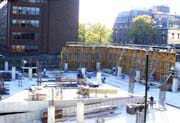Mayor David Roberts announced in November that city officials and officials from the Stevens Institute of Technology discussed stopping work on a controversial construction project on the private university’s campus. Construction had begun in March from the Babbio Center of Technology Management at the corner of Sixth and River Streets, but some said it looked like the institute was working on a 725-car garage that had not been approved yet.The university has gotten approval only for construction of a six-story building to accommodate classrooms, lecture halls, administrative and faculty offices, a restaurant and classrooms.
An investigation by noted land use attorney Michael Pane determined that Stevens was building beyond what they had received approval for, and they were asked to stop.
When the Roberts made his announcement on Nov. 8, it was unclear whether the "stop work" agreement would include the area where the "garage" is being built or would include the entire construction site. During the last several weeks, many people witnessed construction workers continuing to work at the site.
The city’s director of community development, Fred Bado, offered an explanation for the continuing work Thursday morning.
"My understanding is that there is some work continuing regarding the foundation and items related to the Babbio Building, all of which have been approved," said Bado. "They have stopped all work related to the parking garage facility."
In a statement from Cass Bruton-Ward, the university’s director of University Relations, she said that work continues on the foundation and the Babbio Center. "We’re currently working on the foundation for the Center for Technology Management," said Bruton-Ward. "We’re excited about this building and are proceeding in conformance with our permits."
Bruton-Ward added that the university anticipates the completion of the Babbio Center for Technology Management in 2004. She added that the new building is an essential part of Stevens’ overall educational objectives. "The new center will specifically benefit Hoboken by making it more attractive to top-flight businesses considering locating here," said Bruton-Ward. "That impact is significantly different from that of residential development, which has been criticized in the community as having been a primary factor in what’s seen as the overbuilding of Hoboken."
Mayor Roberts said it is his belief that the school is only working on the Babbio Center and not the 725-car parking garage. "I believe that they have stopped work on the garage element of that foundation," said Roberts on Nov. 25. "The have zoning [for the Babbio Center and foundation] and I am assuming that is all they are building right now."
What happens now?
According to Bado, there are a couple of things that need to happen before the university is able to make a formal application to the Planning Board for the 725-car parking garage.
First, he said, the Planning Board has requested a "mater plan for development at Stevens." According to Bado, this document would outline the school’s plan for future construction and expansion. It would also summarize the school’s parking requirements in the future. According to Bado, the university had said that this "master plan for development at Stevens" would be ready just after Thanksgiving, so he expects that it will be presented to the Planning Board shortly.
According to Bado, the second thing the university must do before it can submit an application to the Planning Board for the garage is to make a request to the Planning Board to review the zoning ordnances that apply to the Stevens campus.
Last year, members of the Historic Hudson Street Coalition (HHSC), a citizens’ group that spent thousands of dollars and many hours in meetings with lawyers and planners, successfully defeated a proposed Stevens garage slated for the corner of Eighth and Hudson Street.
During that process, the HHSC wrote and the City Council passed an ordinance that puts significant restrictions on what kinds of buildings Stevens can put up within 100 feet of any residential district.
According to Stevens’ attorney, Charles Liebling, that ordinance could have an impact on this project also. He added that because of that legislation, this project might have to seek 10 or more variances, some of which could be considered major.
Bado noted Thursday that the since it is a city zoning ordinance, only the City Council has the authority to make changes. "The school will have the Planning Board review the items [it wants changed] and will have them make a request of the City Council," said Bado.
If the university is successful in both of those tasks, then the school can present a formal application to the Planning Board and a public hearing will be held.
